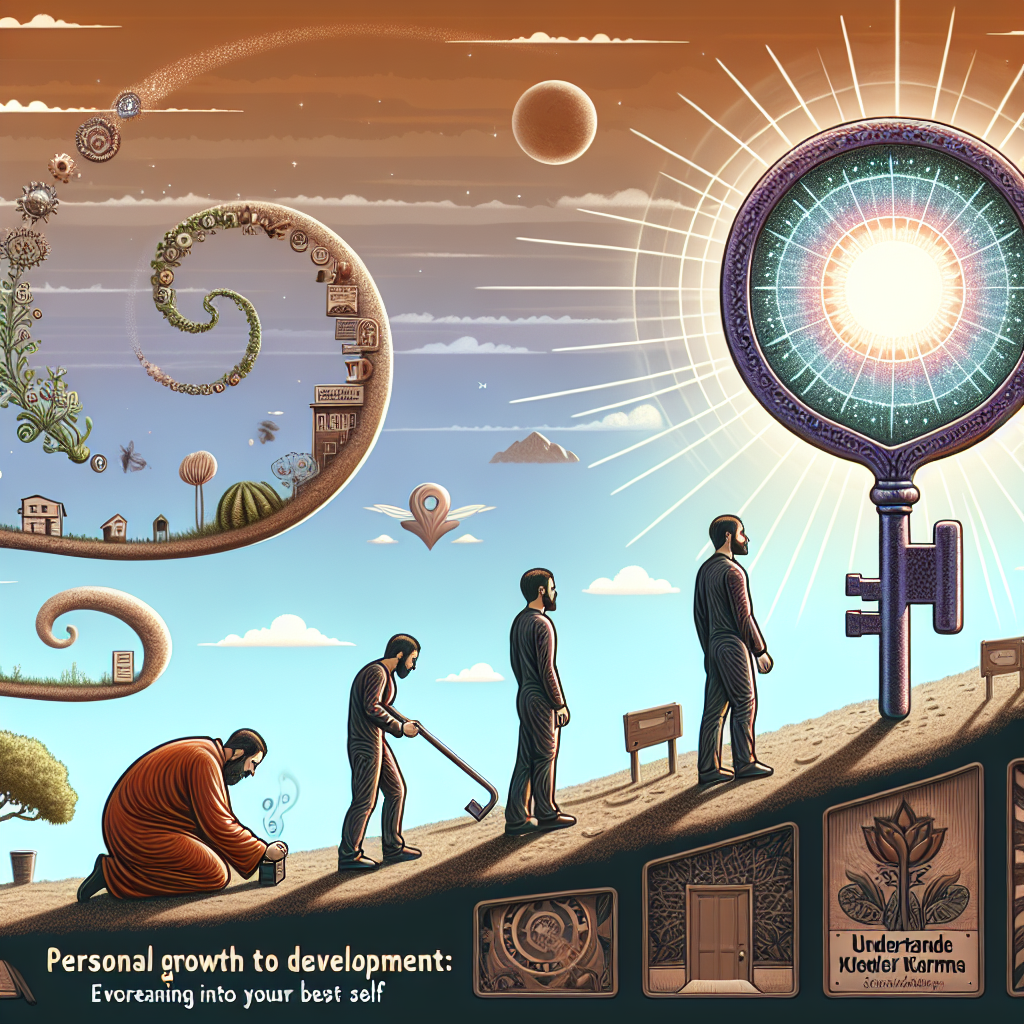Karma is often understood simply as a moral accounting system – a cosmic ledger where good deeds accumulate and bad deeds lead to potential punishment. However, the concept is much richer and more complex than this simplified view. Understanding karma not only influences spiritual beliefs but also holds profound implications for personal growth, decision-making, and the way we interact with others.
What is Karma?
Karma originates from the ancient Sanskrit word ‘karman,’ meaning “action” or “deed.” In various philosophical and religious traditions, karma is tied to the principle of cause and effect, implying that every action has consequences. The primary belief is that the actions we take influence our future experiences, shaping our destiny in this life and beyond.
The Different Types of Karma
Karma can be categorized into several types, each serving its purpose in the journey of personal growth:
- Seed Karma (Samskara): These are the deep-seated tendencies and habits ingrained in our psyche through past actions and experiences.
- Action Karma: Refers to the actions we take in the present moment that generate consequences in the future.
- Fruition Karma: This is the karma that has already ripened, manifesting as experiences or events in our current life.
- Collective Karma: The shared karma of a group, society, or community influenced by collective actions and intentions.
The Role of Karma in Personal Growth
Karma is not merely a form of cosmic punishment or reward; it acts as a teacher that guides personal development. By understanding the principles of karma, individuals can reflect on their actions, making conscious decisions that align with their values and goals.
Karma and Responsibility
One of the most empowering aspects of karma is the concept of personal responsibility. Recognizing that our actions lead to specific outcomes encourages individuals to take ownership of their lives. This sense of accountability fosters a proactive approach to personal growth, motivating individuals to engage in positive actions that lead to beneficial results.
Learning Through Consequences
Each experience we encounter, whether positive or negative, provides valuable lessons. Understanding karma allows us to view challenges as opportunities for growth. Instead of resisting or blaming others for our circumstances, we can approach situations with an open mind, asking ourselves what we can learn and how we can evolve through these experiences.
Karma and Relationships
Karma also plays a crucial role in our interactions with others. Our relationships reflect the energy we put out into the world. By treating others with kindness and respect, we generally foster positive connections, which in turn contribute to our own well-being and happiness. Recognizing the karmic impact of our relationships can help us cultivate healthier dynamics, leading to personal growth.
How to Cultivate Positive Karma
Understanding karma empowers individuals to consciously engage in actions that nurture their personal growth. Here are some strategies to cultivate positive karma:
- Practice Mindfulness: Being present allows you to recognize the impact of your actions, enabling you to make thoughtful choices.
- Engage in Compassionate Acts: Acts of kindness not only benefit others but also create positive energy that can return to you.
- Learn from Mistakes: Rather than dwelling on past mistakes, view them as valuable lessons that can steer you towards better choices in the future.
- Fulfill Responsibilities: Taking care of your obligations, whether personal, professional, or social, demonstrates integrity and accountability.
- Practice Gratitude: Cultivating an attitude of gratitude helps you focus on the positive aspects of your life, enhancing your overall experience and karma.
The Connection Between Karma and Spiritual Growth
Karma is deeply intertwined with spiritual growth and understanding. Many spiritual traditions emphasize the importance of aligning one’s actions with higher values, such as love, compassion, and selflessness. Here’s how karma enhances spiritual development:
Karma and Inner Peace
As individuals learn to navigate their lives through the lens of karma, they often discover greater inner peace. By releasing resentment and forgiving themselves and others, they can transcend negative patterns and emotional baggage, leading to a more peaceful existence.
Detachment from Outcomes
Understanding karma encourages individuals to focus on the action rather than the outcome. This shift allows for a more detached approach, reducing anxiety and fear about future results. By releasing attachment to specific outcomes, one can maintain serenity regardless of life’s circumstances.
Service to Others
Engaging in selfless service (seva) not only generates positive karma but also nurtures spiritual growth. Helping others connects us to the broader human experience, fostering empathy and promoting a sense of community. This interconnectedness is a fundamental aspect of spiritual evolution.
Real-Life Examples of Karma in Action
To further illustrate the concept of karma, consider the following real-life examples:
Example 1: Professional Growth Through Teamwork
A professional who consistently supports team members and takes the time to mentor others may find that their colleagues are more willing to collaborate and assist them in return. This creates a positive work environment, enhancing everyone’s growth and performance.
Example 2: The Ripple Effect of Kindness
A simple act of kindness, such as helping a stranger, can initiate a ripple effect. The recipient of that kindness may feel inspired to help someone else, creating a chain reaction of positivity that ultimately benefits the individual who initiated the act.
Example 3: Learning from Mistakes
An individual who learns from their misjudgments and takes steps to rectify them demonstrates personal growth. For instance, if someone makes a poor financial decision, rather than fixating on the mistake, they can use the experience to develop better financial habits in the future.
Myths About Karma
While the concept of karma is widely discussed and embraced, several myths and misconceptions exist. Addressing these can help clarify our understanding:
Myth 1: Karma is Punishment
Many perceive karma as a karmic retribution or punishment. In reality, karma is more about learning and growth. Negative experiences can serve as important lessons instead of mere punishment.
Myth 2: Karma is Instantaneous
Karma does not operate on a strict timeline. The consequences of actions may take time to manifest, leading some to believe that karma is not real when consequences aren’t immediate.
Myth 3: One Action Determines All Outcomes
Karma is a complex interplay of numerous actions and habits. One single act does not define a person’s entire karma; rather, it is the cumulative effect of many choices that matters.
Conclusion
Understanding karma provides a powerful framework for personal growth and spiritual development. By recognizing that our actions influence not only our lives but also the lives of others, we can cultivate a more thoughtful and deliberate approach to life. Embracing karma encourages self-reflection, accountability, and a deeper connection to the world and those around us.
Incorporating the principles of karma into our daily lives allows us to experience growth, learn from our mistakes, and foster positive relationships. By consciously striving for positive actions, we can create a ripple effect that not only benefits ourselves but also contributes to the greater good of humanity.
FAQs
What is the origin of the concept of karma?
Karma originates from ancient Indian spirituality and philosophy, particularly within Hinduism and Buddhism, where it serves as a fundamental principle explaining the moral law of cause and effect.
Does karma only apply to actions in this life?
While karma is often associated with actions in this life, many believe it also encompasses actions from previous lives, impacting our current circumstances and experiences.
Can you change your karma?
Yes, individuals have the power to change their karma through conscious actions and decisions. By engaging in positive behaviors and reflecting on past mistakes, one can cultivate better outcomes.
Is karma the same as fate?
Karma and fate are interconnected but not the same. Karma reflects the impact of actions on future experiences, whereas fate can imply a predetermined outcome. One’s karma can influence their fate, but it does not solely define it.
How can I apply karma to my daily life?
You can apply the principles of karma by being mindful of your actions, practicing kindness, learning from experiences, and taking personal responsibility. Fostering positive relationships and engaging in selfless acts will strengthen your positive karma.
, It seems like you’ve mentioned “Prompt” without providing any specific context or details. Could you clarify what you would like me to help you with? For example, are you looking for writing prompts, conversation starters, or something else entirely? Let me know what you need!, #Understanding #Karma #Key #Personal #Growth, #Understanding #Karma #Key #Personal #Growth, 1734061192, understanding-karma-the-key-to-personal-growth





